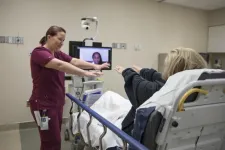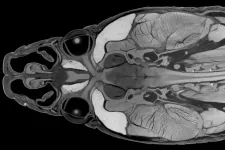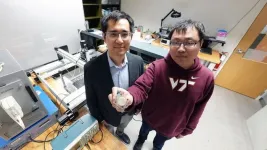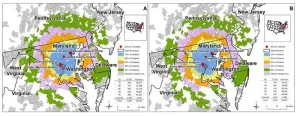Geisinger funding renewed for familial hypercholesterolemia research
New $3 million grant to build on improved communication with patients and family members
2024-05-22
(Press-News.org) DANVILLE, Pa. – Geisinger has been awarded $3 million from the National Heart, Lung and Blood Institute of the National Institutes of Health to continue its research on familial hypercholesterolemia (FH). The new funding will build on Geisinger’s ongoing work to improve communication with patients with FH and their family members and increase early screening and diagnosis.
FH is an inherited condition that causes high levels of low-density lipoprotein (LDL) cholesterol, often referred to as “bad cholesterol.” Left untreated, high levels of LDL cholesterol can lead to heart disease, heart attack or stroke. People with FH can significantly reduce their risk of these cardiac events if they are screened and begin lipid-lowering treatment early in life. Screening relatives of someone diagnosed with FH, known as cascade testing, can lead to earlier diagnosis and treatment and prevent disease.
With the original $2.8 million IMPACT-FH (Identification Methods, Patient Activation and Cascade Testing for FH) grant, awarded in 2019, the Geisinger research team developed new ways to communicate with patients about FH, including traditional letters and digital tools like chatbots. The team also developed a direct contact program, in which a genetic counselor reaches out to a patient’s relatives to inform them about their risk for FH and connect them to resources for testing and care.
In a trial of 175 people, 70% chose to use at least one of the redesigned communication strategies to reach at least one adult relative. These relatives were six times more likely to complete FH cascade testing than relatives who were not contacted through one of these strategies. When direct contact by a genetic counselor was chosen, relatives were 17 times more likely to complete testing. In all, 144 adult relatives of the trial group completed cascade testing with 48% having a positive result for FH. Forty-one children younger than 18 also completed cascade testing and 42% had a positive result for FH.
“The IMPACT-FH grant developed patient-centered strategies that improved FH cascade testing, enabling more individuals to learn about FH and pursue recommended care to potentially prevent heart disease, heart attack, and stroke,” said Gemme Campbell-Salome, Ph.D., assistant professor in Geisinger’s Department of Genomic Health and principal investigator for the IMPACT-FH study. “This new funding will build on our work to improve FH diagnosis by supporting family communication and screening in the primary care setting. Our long-term goal is to create a sustainable population screening program that can improve the health of people with FH.”
As part of this renewed funding, Geisinger will partner with experts in implementation science at the University of Sydney in Australia to explore strengths and challenges in FH screening programs in the United States and worldwide.
###
About Geisinger College of Health Sciences
Geisinger College of Health Sciences is the research and education arm of the Geisinger family. Geisinger is committed to making better health easier for the more than 1 million people it serves. Geisinger is the inaugural member of Risant Health, a nonprofit dedicated to expanding and accelerating the adoption of value-based care. Founded more than 100 years ago by Abigail Geisinger, the system now includes 10 hospital campuses, a health plan with more than half a million members, and the College. The College houses a Research Institute, graduate medical education, and schools of medicine, nursing and graduate education, in addition to faculty and professional development programs. The College is committed to non-discrimination in all employment and educational opportunities. Visit geisinger.edu/gchs.
END
ELSE PRESS RELEASES FROM THIS DATE:
2024-05-22
A team of solar scientists have uncovered the possible originals of the engine that drives much of the sun’s volatile nature—generating the sunspots that move like storm clouds over the surface and causing the sun’s activity levels to rise and fall over 11-year cycles.
The secret behind this engine, also known as the “solar dynamo,” may be among the oldest “unsolved problems of physics,” said Benjamin Brown, a solar physicist at CU Boulder.
In new research, he and his colleagues used mathematical equations ...
2024-05-22
Key stroke-care metrics improve at telestroke hospitals with stroke center certification and stroke coordinators.
That’s what NORC researchers at the University of Chicago found when they conducted an external evaluation of the telestroke program at the Medical University of South Carolina. NORC, which stands for National Opinion Research Center, and MUSC researchers report their findings in the Journal of Stroke & Cerebrovascular Diseases.
Mithuna Srinivasan, Ph.D., principal research scientist at NORC, is the lead author of the article and MUSC telestroke and telehealth experts Christine Holmstedt. D.O., Jillian Harvey, Ph.D., ...
2024-05-22
Public interest in weight loss drugs like Wegovy and Ozempic is surging, but national data on dispensing patterns in the United States are surprisingly scarce.
Now, a national study from Michigan Medicine shows that the use of these weight loss drugs is increasing rapidly in adolescents and young adults 12-25 years, especially females.
Using 2020 - 2023 data from a national database representing 92% of pharmacies, the study team found a 594% increase in the monthly number of adolescents and young adults using Wegovy, Ozempic, and other glucagon-like peptide-1 receptor agonists ...
2024-05-22
Reading about the latest scientific discovery – such as the unearthing of a fossil representing a new species of tiny dinosaur – can be fascinating. But what if it were possible to do more than just read about it? What if you could go online, download a digital model and 3D print an exact replica of that fossil within minutes of reading the news? That is the goal of the Non-Clinical Tomography Users Research Network, or NoCTURN, an international group of researchers spearheaded by theUniversity of Arizona Health Sciences, the American ...
2024-05-22
Autism is the most common neurodevelopmental disorder in the U.S., affecting an estimated one out of 36 children. Most people with autism experience unique sensory features such as differences in reactivity to touch, sounds, and sights or difficulty managing multiple sensory inputs at the same time.
These sensory differences can make the healthcare environment — often characterized by fluorescent lights, idle waiting rooms and uncomfortable pokes and prods — difficult to navigate, preventing children with autism from getting the care they need. To change that, occupational therapists Roseann ...
2024-05-22
Medical procedures capable of moving cells inside the body without making incisions have unique benefits. From faster recovery times to less trauma impacting the body, the list of reasons to do surgery without scalpels is growing with the technology used to perform noninvasive treatments.
A new method that might be available in the future is coming to life through research conducted by Zhenhua Tian’s team. The assistant professor in the Department of Mechanical Engineering is using tube-shaped acoustic energy to capture tiny biological ...
2024-05-22
TORONTO, May 22, 2024 – Community science volunteers – laypeople with an interest in bees and conservation – significantly contribute to the scientific knowledge of native bumble bees across Canada and the United States, finds a new study by York University.
It’s buzz worthy confirmation that community science programs can play an important role in monitoring the changing distributions of bumble bees and more. Community scientists have importantly also detected several at-risk or endangered species in unexpected locations, including the rusty-patched bumble bee and the gypsy cuckoo bumble bee. Trained scientists often haven’t seen some ...
2024-05-22
Location, race and insurance status play a significant part in the odds of a patient being diagnosed with early-stage or late-stage cancer, according to a detailed medical records analysis of more than 94,000 patients with cancer by researchers at the Johns Hopkins Bloomberg School of Public Health and the Johns Hopkins Kimmel Cancer Center.
Patients who lived farther away from a facility designated a comprehensive cancer center (CCC) by the National Cancer Institute (NCI) and who received only a diagnosis or only treatment at the center had higher than average odds of a late-stage diagnosis, ...
2024-05-22
Surgery involving sentinel lymph node biopsy for middle-aged women with estrogen receptor-positive (ER+) breast cancer may do more harm than good, according to a new study led by University of Pittsburgh and UPMC Hillman Cancer Center researchers. The team used a novel artificial intelligence pipeline developed by Realyze Intelligence, a UPMC Enterprises portfolio company, to analyze electronic health records.
The findings, published today in JCO Clinical Cancer Informatics, suggest that clinical guidelines for de-escalating surgery in women aged over 70 years with early-stage ER+ breast cancer may be safely ...
2024-05-22
MINNEAPOLIS – People who eat more ultra-processed foods like soft drinks, chips and cookies may have a higher risk of having memory and thinking problems and having a stroke than those who eat fewer processed foods, according to a new study published in the May 22, 2024, online issue of Neurology®, the medical journal of the American Academy of Neurology. The study does not prove that eating ultra-processed foods causes memory and thinking problems and stroke. It only shows an association.
Ultra-processed foods are high in added sugar, fat and salt, and low in protein and fiber. They include soft drinks, salty and sugary snacks, ...
LAST 30 PRESS RELEASES:
[Press-News.org] Geisinger funding renewed for familial hypercholesterolemia research
New $3 million grant to build on improved communication with patients and family members





